A few miles north of San Francisco, off the coast of Sausalito, is Richardson Bay, a saltwater estuary where roughly one hundred people live out of sight from the world. Known as anchor-outs, they make their homes a quarter mile from the shore, on abandoned and unseaworthy vessels, doing their best, with little or no money, to survive. Life is not easy. There is always a storm on the way, one that might capsize their boats and consign their belongings to the bottom of the bay. But when the water is calm and the harbormaster is away, the anchor-outs call their world Shangri-lito. They row from one boat to the next, repairing their homes with salvaged scrap wood and trading the herbs and vegetables they’ve grown in ten-gallon buckets on their decks. If a breeze is blowing, the air fills with the clamoring of jib hanks. Otherwise, save for a passing motorboat or a moment of distant chatter, there is only the sound of the birds: the sparrows that hop along the wreckage of catamarans, the egrets that hunt herring in the eelgrass, and the terns that circle in the sky above.
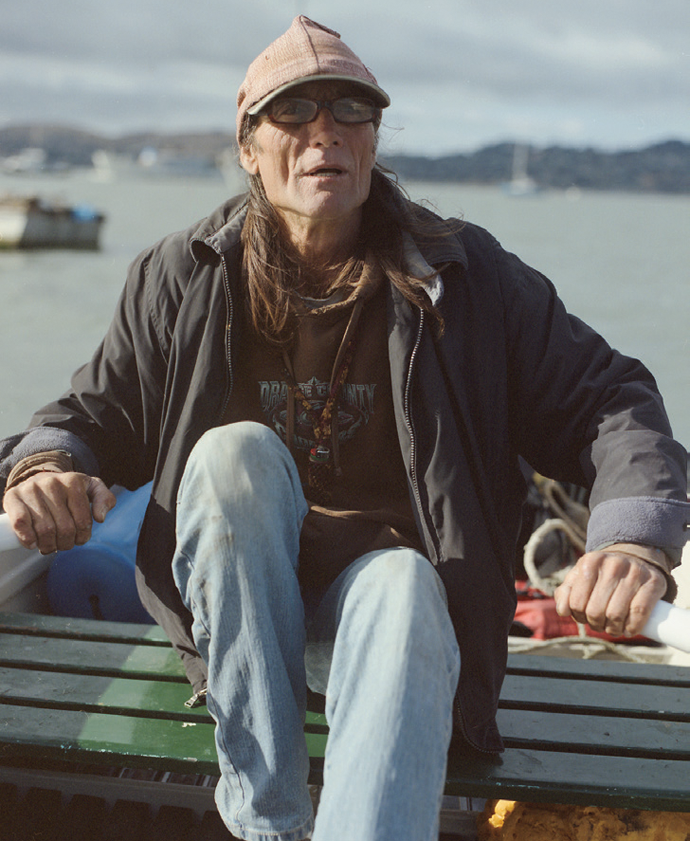
Dream Weaver, who lives on a restored lifeboat in Richardson Bay, travels to and from shore by skiff. All photographs by Therese Jahnson © The artist
On sunny days, the anchor-outs make for the waterfront. They toss their garbage in the dumpsters outside a 7-Eleven and gather together on a four-acre stretch of grass called Dunphy Park. They lie in the shade of box elders and oaks, reading to one another from the newspaper as their children play nearby, ankle-deep in the water. Some discuss their stays in the county jail. Others dream up inventions they will never build, like a heater made from magnets or a shower that runs on a gas-powered generator. Once in a while, a small group convenes near a boat slip to hear a sailor with a long beard and a gnarled walking stick lecture on the anchor-outs’ right to live on the water, a case he makes with dog-eared copies of county ordinances, maps, and city contracts that he prints at the public library and carries around in grocery bags.
I began spending time in the park a few years ago, drawn to the ease with which the anchor-outs took what came their way. Court dates and rough waters always loomed, and the church van promising a free hot meal was never guaranteed to arrive, but these were only temporary setbacks; the anchor-outs had built a paradise, if only the rest of the world would let them enjoy it.
One afternoon, on an early spring day in 2015, I struck up a conversation about the bay with an anchor-out who went by the name Innate Thought, though he was born Nathaniel Archer. Innate had lived on the water for more than a decade and was now almost fifty years old, with a sun-worn face and a generous, worried smile. He was sitting on a bench, listening to a portable radio. He told me he was happier living on the water than he had ever been, and explained his contempt for the world ashore with a story about requesting a free packet of barbecue sauce from a cashier at the local Burger King.
“She said, ‘I’m sorry, I have to charge you twenty cents.’ I said, ‘I know, I remember when we were going through an economic crisis and Burger King replaced those plastic menu boards with TVs. So I know you’ve incurred some costs.’”
Innate fixed his gaze on me. “What was she protecting?”
I shrugged.
“She’s protecting against me coming in every day, taking five sauces, and selling them outside.” He asked if I understood the damage that is done when everyone expects the worst from one another.
I nodded politely, and Innate gave me a knowing grin. “When we start to be happy, it’s a hard transition—because of how we’ve groomed each other.”
That afternoon, Innate offered all manner of reasons why he chose to live on the water: loneliness had taught him to love himself; America’s departure from the gold standard had delegitimized capitalism; rich people all go to hell. By the time evening came, I realized we hadn’t eaten anything all day. He looked weary. I asked him if he ever missed his old life, when he worked in IT and woke each morning to hot water, money in his pocket, and a pantry of food.
“That’s not what makes me smile,” he said. “The happiness I get comes from the toil.” He opened his bag, pulled out a clementine, and handed it to me.
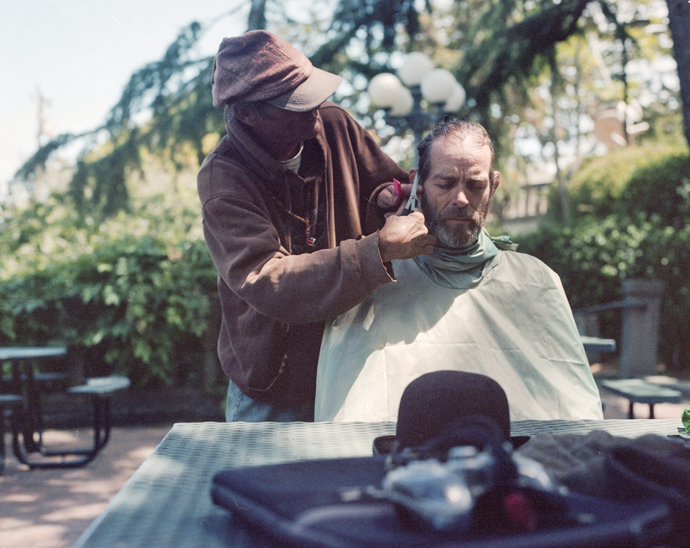
Dream Weaver gives his brother, Innate Thought, a haircut—a service Dream provides for many anchor-outs.
I spent much of the next few days on Innate’s boat, a barge anchored in the middle of the bay. It had clapboard walls and a sagging plywood ceiling. He shared it with his partner, Melissa Arenz, along with three Siamese cats and a pair of seagulls that nested on the roof. The male bird limped. One of its feet was mangled, like a city pigeon’s. Innate and Melissa had taken to calling him Goofy. The other they called Broad because, Innate liked to say, “That’s his broad.”
Innate brewed coffee on a hotplate and talked about his life before the anchorage; about his marriage and its dissolution; about the disappearance of his father, who spent his final years sweeping sidewalks for pocket change in Laguna Beach, introducing himself to strangers as “No One”; and about the event that pushed him out onto the water: when a U-Haul packed with his dog and all of his possessions was stolen from a gas-station parking lot. “I just started thinking: everything I owned just burned in a fire,” he said.
Innate had a big personality, but he was careful with it. He sometimes worried that he was speaking for the entire anchorage, which he often referred to as an “ever-giving society gumbo.” One morning, over a plate of grits, he declared that he’d said all he would about the anchor-outs, but he offered to take me to see a ninety-one-year-old man named Larry Moyer, who had lived in Richardson Bay for nearly fifty years. He’d been meaning to speak with Larry anyway, about some footage Larry had shot of Sausalito years ago that Innate wanted to use in a film he was making.
Innate put on his bathrobe and bowler hat, loaded a few bags into his motorboat, and shook the engine to life with a few pulls of the starter cord. He swept his long hair from his face and warned me not to try to shout over the motor’s roar. “The people onshore hear everything!”
The ride to Larry’s took only a few minutes. His boat was tied up at Liberty Dock, on the northern end of Sausalito. It was a big, two-story vessel. The steel hull had been taken from an old World War II balloon barge, and built atop it was a wood-sided cabin that looked to be from a fairy tale. It was named the Evil Eye, but Innate and the other anchor-outs referred to it as “Shel’s Boat,” after the previous owner, Larry’s friend Shel Silverstein, who named Larry as its caretaker before his death in 1999.
The door to the Evil Eye was open, but it was mostly dark inside, illuminated by rays of red, green, and yellow from a stained-glass window. As we entered, Larry’s Siamese cats, Leroy, Mumbo, Jumbo, and Handsome Harry, scrambled over piles of rusty tools. We spotted the old man seated next to an oxygen tank, in a bedroom at the bow of the boat. He was shirtless, rapping his fingernails against the cover of a book of Karl Marx quotations. I sat down at a table cluttered with unopened mail. The appearance of a stranger in his bedroom did not move Larry. He took a sip from a goblet of water and asked Innate something about video equipment. Running his fingers through his long, yellow-white beard, he said, to no one in particular, “You’re born with too many marbles. You can afford to lose some. In fact, you only need one marble.”
Innate laughed and turned his attention to a library of videocassettes mounted on the wall. There looked to be at least a hundred tapes, each one labeled by subject. There was 616: sunrise, 408: dry hump, 405/1: fish head tom, and 405/2: fish head tom sinking. There was footage of shorebirds, taken before the crows arrived and learned to raid nests, and footage of the cats that once lived in the rafters of Larry’s boat. The collection, all of it shot in Sausalito, dated back decades, to Larry’s early years at Richardson Bay, when he was working with Silverstein as a photojournalist for Playboy. It was the life’s work of a reporter who’d found his story. “I got here,” he told me, “and I said, ‘I don’t ever want to do anything again for the rest of my life.’”
While the two discussed the tapes, I lost track of time wondering about the film Innate was making, the film in want of the footage labeled dry hump.
Finally, I told them I had to leave, to catch the last ferry of the night.
“Ah, a disciplined man,” Larry said. “We don’t get many of those out here.”
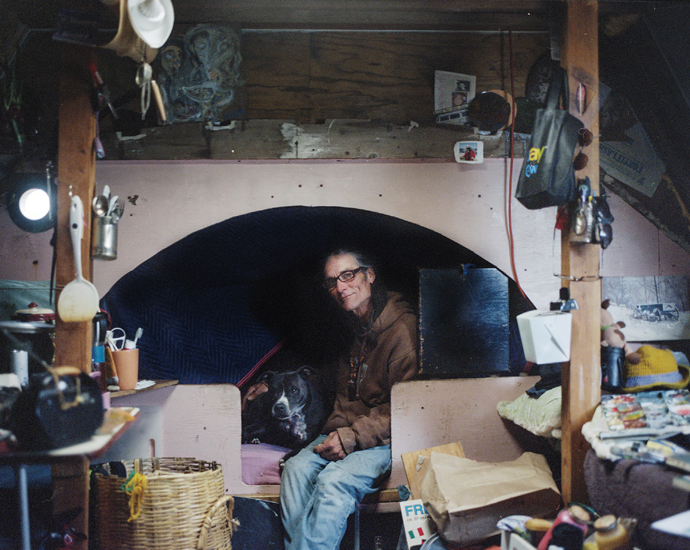
Dream Weaver and his dog, Bleau Bell, on his boat
The bay has served as a stopover for sailors headed down the coast, or out into the Pacific, for at least two centuries. It takes its name from William Richardson, a London-born sea captain who received a 19,500-acre land grant along the water in the 1840s, and then died penniless less than two decades later, after he fell into debt and was forced to mortgage his properties. During Richardson’s early tenure in the bay, it was part of the Mexican territory of Alta California. The shore was lined with laurel trees and sweat lodges built by the Coast Miwok, who had settled in a valley along the northwest waterfront. Richardson and the Coast Miwok operated the estuary as a safe harbor for whalers and tradesmen who’d drop anchor for a week to weather a storm or replenish their fresh water. The first live-aboards came with the Gold Rush, when those who had made fortunes moved onto rectangular crafts with gently curved roofs and French doors, then lost everything playing monte in the city, a period Richardson’s son later referred to as the “reign of whiskey.” They were followed by San Franciscans who had lost their homes in the earthquake and fires of 1906, and then by opportunistic bootleggers and rumrunners. Shortly after Pearl Harbor was bombed, the city built dry docks and floated them into the center of the bay to repair damaged submarine chasers. The docks were abandoned after the war, a time still remembered by some anchor-outs, and new residents moved aboard, until the city paid someone fifty dollars to burn them all down.
Today, people come to the anchorage from all over the country, on Greyhound buses and in rust-eaten cars that are scrapped on arrival. They purchase boats from other anchor-outs for as little as a dollar, or claim damaged vessels discarded by sailors from Oakland and San Francisco, and go to work patching their hulls and sealing their roofs. Time passes: health declines, money runs out. They wake up each day in a creaky plywood boat, with no food and a persistent cough, and, happy or not, for many there is no going back to the old way of things.
When I returned to Dunphy Park, a month later, I met a woman named Rose Smith, who was playing in the grass with her toddler. She was in her early twenties, and had moved to the anchorage from Washington State only six months earlier. “I came for the opportunities,” she told me. She’d been kicked out of her duplex with her daughter, who was from a previous relationship. “My mom is staying with my ex-boyfriend,” she said. “My ex’s mom kicked him out, so he called my mom for some reason. My family should be on Jerry Springer.”
Rose had been receiving disability benefits since she arrived. “But it’s not enough,” she said. “So I’m trying to become famous—it’s the only way.” She pulled out her flip phone and read me a list of puns she had written for a comedy act:
Seareously the best joke ever.
I’m not even squidding.
Tunafish? I can’t even tune a piano.
If you can think of a better fish pun, let minnow.
I didn’t do it on porpoise.
“I’m pretty funny. I can also fake cry, stick my fist in my mouth, and I once won a staring contest with an iguana.”
Rose laughed and looked off at something in the distance, until a big gray pigeon in a nearby gravel lot captured her attention. His breast was puffed out, and he was chasing a female. “They try to have sex,” she said, shaking her head. She kicked rocks at the male bird. “Leave her alone!” The pigeons flew away. “I have these birds fucking on my boat. It’s annoying. I have a kid.”
I glanced out across the park for her daughter, whom I spotted by a gazebo, next to a young boy blowing carelessly into a harmonica.
Rose was always in the park. She had left Washington with the hope that living on the anchorage would allow her to spend time in San Francisco, developing her stand-up act, but the city was farther away than she’d expected. By bus or ferry, it was easily an hour from her boat. She managed to make the trip only once a month, to receive treatment for her multiple sclerosis, which she was diagnosed with when she was twelve. But travel was costly, and her only income, aside from her benefits, came from selling local coffee shop customers roses dipped in wax. Still, she was optimistic that things would turn around. Some anchor-outs had told her of an alternative MS treatment: roasted dandelions. “We mix them with tea or food and we cook them, put them in the oven on low,” she said.
I asked her if the dandelions worked.
“I don’t know,” she said glibly. Along with ginkgo trees, she had begun growing the flowers in a barrel filled with dirt on the deck of her new boat.
Rose had moved there a few months earlier. Her first home, known as the Projectile, was a long black barge that seemed to invite misfortune. “Some guy got stabbed on it,” she said. “It’s just a bunch of crazy shit in this nice town.” She pointed to a spot along the shoreline of the park, where several kayaks and dinghies were tied up, jostling one another as the breeze blew in. The previous week, she told me, she’d found a dead body there. “It was eight in the morning, before I dropped my daughter off at school. He was floating right there by that white boat.”
She pulled out her phone again. “I took a picture,” she said, showing me a black-and-white photo of an older man’s bloated frame, floating faceup. His shirt was open. “It looked like the life was sucked out of him. They shut the whole park down. They don’t know what happened.”
Rose didn’t say much else about the man, whose name, I learned, was Othon Birba. The only news story published about his death ran at about one hundred and fifty words in the Marin Independent Journal. It said that there were signs of injuries but gave no indication as to how he died.
“People think someone out here did it,” Rose said.
Just then, Rose’s daughter wandered back over and grabbed a clementine from a mesh bag resting against a fence post.
“Give some to the birds,” her mother told her.
After the pigeons had gotten their fill, Rose shooed them away once more.
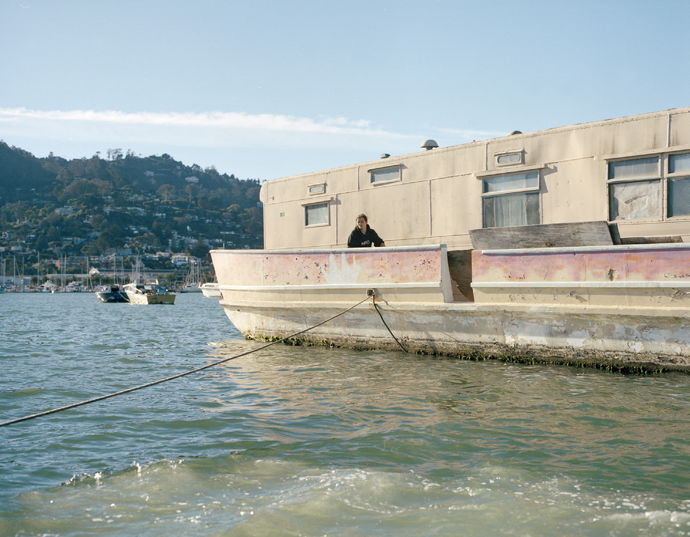
Rose Smith on her boat
Later that day, I walked up the shore to the Evil Eye, to ask about Birba. As I stepped inside, I called out to Larry and his wife, Diane, but no one responded. I found Larry sitting next to his oxygen tank in the bedroom, which was stuffy and dark, even gloomier than usual. A light was flashing from an opening in the floor that led belowdecks, where Diane was watching The Queen of Versailles on a small television. Larry looked tired, and it occurred to me that much of his life was now spent in that chair.
I sat down at the table, where Handsome Harry was lapping up a mug of water next to a joint burning in an ashtray. I asked Larry about Birba’s death, about why so little was known of him.
Larry paused. He didn’t say whether he knew Birba, though he nodded to indicate that he understood the question. Instead, he began telling me about working at the Pearl Harbor Navy Yard in the days after the base was attacked. One of his jobs, he told me, was to cut holes in the capsized hull of the Oklahoma. “We got them out but they were all dead. Kids—eighteen, nineteen, twenty. My great lesson about war was you either end up like this guy or you end up looking down at this guy.”
He took a satisfied sip of water from his goblet, and then a hit of the joint burning next to Handsome Harry. “You want to be ninety-one? Do a bunch of things they tell you you shouldn’t be doing. You’ll get to be a pallbearer for all your doctors.”
Smoke swirled from Larry’s mouth. He spoke again, about God. “God was a great character who lived down here. Cuban guy. Said he was God. He threw his harp and his teeth out the window. He made Joe Gould look like a fucking Girl Scout. One day, he walked down the dock with a machete, cutting boat lines. Last thing I heard about him, he stole a police car.”
I reminded Larry that I’d asked about Birba.
Larry frowned, like I hadn’t been paying attention. “Could be anyone! It was a great nickname place down here. Thunderpussy, Sick Rick, Slick Rick, Normal Norman, Abnormal Norman, Nearly Normal Norman. The only way you found out a guy’s real name was after he croaked. God tried to get his name changed legally. He wanted to sign checks as ‘God.’ The judge wouldn’t let him do it. But he let him do ‘Ubiquitous God.’ ” Larry lowered his voice. “There’re some hard-core people out there. Heavy-duty people. People that have done some shit. A lot of old smugglers, probably some dope dealers. It’s not an easy life out there—especially for women.”
As we spoke, Diane climbed up through the opening in the floor to greet me. Larry asked her to make him a cup of coffee.
“It will keep you up all night,” she said, adding that he would be in a lousy mood tomorrow.
“I don’t give a shit.”
“I know.” She sighed, and descended to the deck below.
Handsome Harry leaped off the table and stuck his head inside a saucepan filled with cat food.
Larry watched the cat eat. “I’ve been in love with cats for fifty years. They’re always part of my scene.”
I asked him why he thought that was.
“It’s hard to say,” he responded. “Why do you love anything? A friend of mine calls me the other day and asks, ‘Do you love your wife?’—I thought, wow, what a question. I had to think about that. I meant to ask him why he asked me that. I’ll have to ask him, or maybe not. There are some things you don’t ask about.”
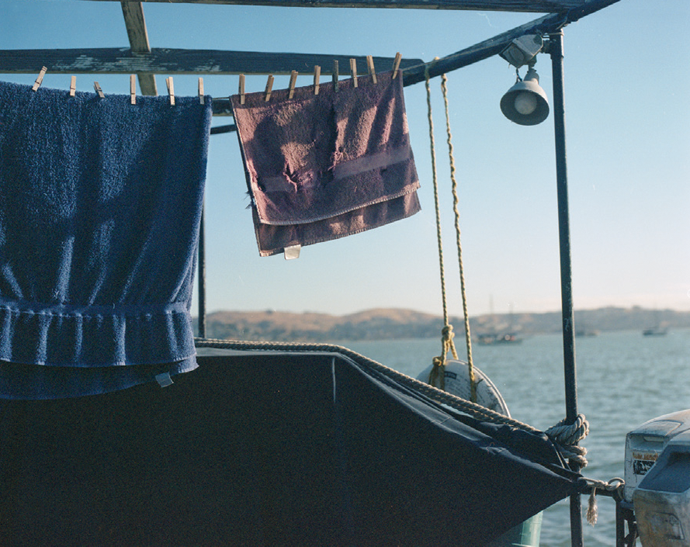
Laundry drying above deck on Innate and Melissa’s boat
From the anchorage, Sausalito looks like a foggier version of a coastal town in Spain or Italy. Most of its residents live on the face of a hill, some of them in large, soft-hued Victorian mansions that were built by wealthy San Franciscans and British expatriates more than a century ago. The homes have long wooden porches and colorfully glazed flowerpots filled with lilies and roses. Sausalito’s working class occupies the neighborhoods along the water, where Portuguese builders and Chinese shopkeepers lived in the years after the Gold Rush. One of the oldest of these neighborhoods, Turney Valley, is a few blocks from the shore. The area was inhabited by the Coast Miwok tribe for thousands of years. When Richardson arrived, he built his hacienda there. Decades later, it housed a bottling plant, which was later bought by a former railroad man named Smitty, who turned it into a bar, named it after himself, and then won the lottery and sold it to his daughter.
Smitty’s is a big and airy place, though it still smells like stale cigarette smoke. Many of its regulars are “hill people,” as the anchor-outs refer to Sausalitans. On any given afternoon, one can find all manner of debates about the anchorage being fought out across the barroom. Some patrons nostalgically recall the old times, when the anchor-outs were sailors who knew how to handle a boat, how to safely ride out a storm. Some complain they should not be there at all, pointing to an ordinance, passed by the local bay association in the 1980s, declaring that no one can stay in the anchorage for more than seventy-two hours without permission from the harbormaster. Others counter that the anchorage is federal water, and that local authorities had no right to make such a rule. Given time, any two patrons will arrive at a disagreement on the topic.
I found myself at Smitty’s that Fourth of July, passing time before San Francisco’s fireworks began. On a bench outside the door, a man was smoking a cigarette. I asked him how he felt about the anchor-outs.
“Well, it’s a problem,” he said. “In the past three months crime and robberies onshore and off have gone up.”
I often heard this assertion about rising crime around town, and it was later confirmed to me by the police. They cited the increasing number of people moving onto the water, especially since the 2008 financial crisis, when boat owners began abandoning their vessels. As the community of anchor-outs had grown, so too had efforts to remove them.
The man took another drag of his cigarette and reassessed. “It’s a shame. They’ve been there a long time.”
Inside, the bar was almost empty, save for a group of locals in polos and khaki shorts.
It didn’t take long for the anchor-outs to come up. A man leaned over to me, as if to share a secret. “When you are talking about the anchor-outs, you are talking about homeless people,” he said. “People who live under a bridge in L.A.”
I asked him what his point was, and he shrugged and leaned away.
Soon after, a woman slung her arm around the man’s shoulder and loudly addressed the bar. “We need a ride over to the yacht club. Anyone going that way?”
Another group obliged, and everyone promised to see one another that evening for the fireworks.
After they left, I asked an older man who’d been quietly sipping a beer about Birba.
“The guy that got stabbed?”
I told him I wasn’t sure: that detail hadn’t been reported in the news.
“This is a small town,” he said.
When evening fell, I left Smitty’s for the park, where the anchor-outs were having a Fourth of July cookout. Innate’s brother, Dream Weaver, was standing with Rose near a spread of aluminum dishes filled with rice and raw eggs. Rose offered him a paper plate, but he declined, opting instead to store an egg in the breast pocket of his flannel shirt. He patted it gently. “Sometimes you don’t get them home in the same pristine condition,” he said, matter-of-factly. He scooped a mound of rice into a small carton and picked up a few clementines, which on the anchorage were as common as cigarettes.
I asked him where the clementines all came from.
“Some lady brings them,” he said. “Her son lives offshore. It doesn’t mean that she will continue to do it, just that that’s what she’s been doing.”
Dream, a former clown born Richard Archer, was a grim and lanky guy in his fifties who always had a black pit bull named Bleau Bell by his side. He told me he had celebrated the holiday on July 2, when the Founders officially voted for independence, but he would nevertheless be watching the fireworks on the boat of his friend Van Bo, if I’d like to come along.
We walked up to his dinghy, which was tied up at a harbor just north of Dunphy Park. It was a small wooden rowboat with a few sun-bleached orange life preservers shoved beneath the stern-side bench. “They’re there if you need ’em,” he told me as I climbed aboard. “But you won’t.” He laughed, for some reason.
As we rowed out into the bay, I brought up Birba.
Dream frowned. “They think it’s a murder and not a man who foiled himself to death.”
I asked him what he meant.
“There is nothing there!” he shouted.
We stopped first at Dream’s boat. The hull was gray, no more than forty feet in length. Sheets of plywood covered the cabin’s windows, and its walls appeared to have been erected haphazardly, like a birdhouse built for a woodshop class. As we reached the floating dock, Dream leaned toward me: “I’m gonna take a hit of LSD, just saying.”
He climbed aboard, Bleau Bell following close behind, and the pair disappeared through the narrow cabin doorway. I followed a few minutes later. Inside, Dream was sitting on a bench affixed to the wall. The only light in the room came through the doorway.
“I am a weirdo—the weirdo of my family,” he said. He lifted a piece of plywood that was covering the window and looked out across the anchorage, at the two hundred and fifty or so beat-up vessels bobbing in the water. Only half were occupied. The anchor-outs used the others for storage or, in some cases, filled them with trash. “The world that we live in has nothing to do with what we believe in,” he said.
Dream picked up a tall can of Heineken that was resting on a hot plate. “I’ll drink this. That’ll help.” He sighed, and reconsidered. “No, it won’t.” He reconsidered again, taking a sip of what must have been a very tepid, flat beer, and shook his head. “I’m lost.”
We sat for a while, listening to the radio without speaking. At nightfall we headed out for Bo’s boat. Born Robert Conley, Bo was a sixty-eight-year-old artist who spent his days riding along the shoreline on a gold-painted bicycle collecting pieces of scrap wood he used as canvases. For years, he had painted pictures of the anchorage and its residents. He left his works unsigned and free for the taking on the sidewalks around Sausalito; those who wanted his signature had to find him in the park to negotiate a price.
We arrived to find Bo belowdecks, relaxing in the saloon with a young woman who I gathered was living there. She didn’t give me her name, but told me that she had cleaned up for the party: either side of the room had bright red pillows to sit on, and Christmas lights had been strung from the ceiling. The four of us climbed up onto the deck. As the fireworks started, Dream shouted at the San Francisco skyline glowing across the water, declaring the spectacle a waste of money that could have been spent on the anchorage.
“Richard!” Bo shouted back. “Sit down!”
Bo handed me a can of warm beer, and I asked the young woman where she was from. She told me she had been visiting the United States from Russia, but she had overstayed her visa and was afraid to go back on land for fear the police would arrest her.
As the fireworks continued to explode, Dream continued to shout. Bo, getting drunker, continued begging him to stop. Once the show ended, I realized how late it had become. The bay was silent, and many of the lights on the hill had gone out. I asked Dream for a ride back to shore. We traveled in silence. When we arrived, he gave me a big grin and tipped his hat. I told him I hoped to see him again soon. “It doesn’t matter!” he said, offering me a friendly wave. As he floated away into the dark and fog, I walked back to the bus stop, happy to know where I was headed.
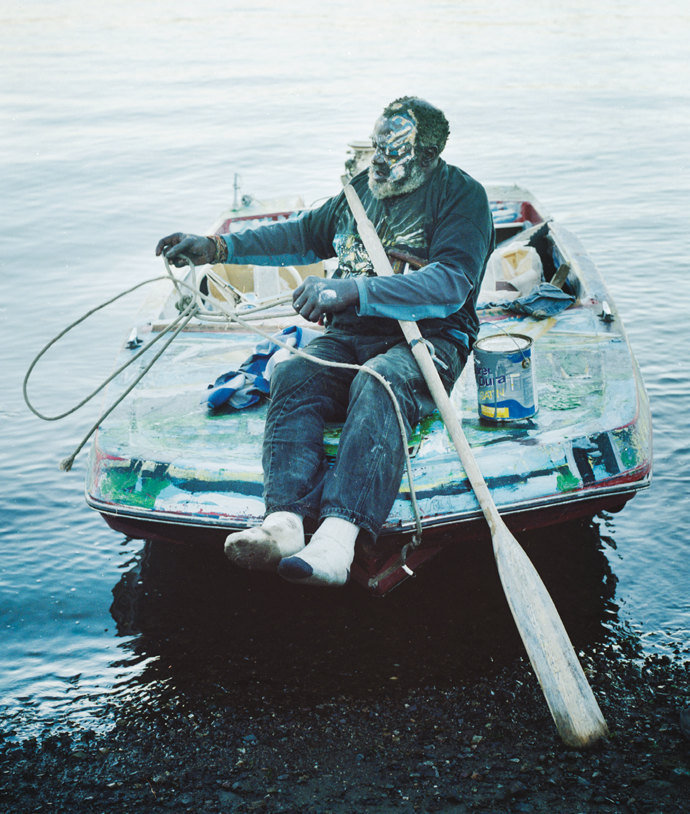
Van Bo preparing to row out to his home
A year passed before I returned to the anchorage. That September, I found Bo in his usual spot, beneath a Dunphy Park oak tree listening to the radio. His hands were covered in paint and he was in a good mood. “A guy started buying my art,” he said. “Then I started thinking differently.” He told me he rarely spent his nights on the water anymore. He’d begun sleeping at a friend’s house and working odd jobs for the locals in town. “I tell them, ‘Excuse me, it’s five-thirty. I got to go home—like the white people.’”
Bo had grown up in segregated North Carolina, and had moved to the waterfront fifty years earlier, when many black working-class boatbuilders still lived in the area. Though I’d heard white anchor-outs claim that their community was “the most diverse group of people in the world,” Bo was one of the few black residents I’d met. “It used to be a shipyard where they’d build ships for the army,” he said. “Then it happened again. They gave the Indians beads for land, then they gave the black guys crack.” Today, Sausalito is more than 90 percent white, part of the fifteenth-richest county in America.
A well-dressed woman approached him and handed him a Steel Reserve. “Thanks, Bessie,” he said.
Bo cracked open his beer. “Everyone tells you how bad it is out there, how you don’t have a bathroom. They don’t let you enjoy it. Everyone is so hung up on toilets. You gotta show people there’s another place in the world other than where they live.”
He looked out on the bay. Barges creaked and moaned in the distance as anchor-outs rowed to and from the shore, occasionally stopping to greet each other along the way. “Things change fast,” Bo said. Not long ago, he revealed, Rose had left the anchorage. “Her boat sank, and she had another baby. I think some other boat might have hit it—might have put a hole in it. They got it up a few times, but then they let it go. She wanted to go home anyway.”
Then there was the death of Ale Ekstrom, a seventy-eight-year-old Navy veteran who came to the bay in 1957 and, in recent years, had been anchored out in Yesterday, a World War II rescue boat where he stored his collection of discarded things found along the waterfront and, after growing tired of a life of drinking, one day began boiling the alcohol out of his Sierra Nevada stouts.
“I might be the oldest—shit,” said Bo. “My birthday’s coming up. I’m getting ready to go.” He told me about the anchor-outs’ funeral tradition. “They make a boat for you. Everyone puts what they got to say to you on it. And they push it out and light it on fire. It’s a pretty good send-off,” he said. “It’s like the Indians. They put the ashes on the boat. If you keep the ashes in an urn, you keep the man locked up. And he might come back someday. Shit, he might be back now.”
I left Bo and wandered over to the spot where Birba’s body had washed up. It was a sunny day, and all the kayaks and dinghies were out on the water. Nearby, Dream was sitting on a bench, in the shade of an old tree. I wasn’t sure if I’d be returning to the anchorage, and I wanted to see Innate. Dream told me Innate was expected for dinner on the boat of an anchor-out named John, and he offered me a ride.
John was waiting for us on the deck when we arrived. Inside, in the dim orange light of a wood-burning heater, I spotted Innate and Melissa sitting on a couch. Innate was wearing his bathrobe, and he stood up to give me a hug. He was smiling, but he looked exhausted. Larry died, he told me. “There was a fire in his trash can. He leaned over to look at it. He had his mask on. The oxygen ignited. It went down his throat and across his body.”
I asked Innate if he was doing okay without his friend, but he waved me off, reminding me of something Larry often said: “When it comes, sayonara, muchachos.”
After we finished eating, Innate and Melissa offered to give me a ride back to shore on their dinghy. The two of them looked cold and ready to get off the water, but as we approached the shore, Innate perked up. “Did you see that?” he asked me, pointing up at the sky. “A shooting star.” I hadn’t.
Some time later, after I returned home, Innate phoned with unexpected news. His mother, who passed away in 2013, had left her house to her five children. He had forgotten about the house when he received word that his sister had sold it and that he was entitled to a fifth of the sale, about $80,000. Innate and Melissa decided to use their newfound wealth to buy a secluded plot of land in Arizona, and settled on a forty-acre property just outside the town of Snowflake. Its soil was soft and seemed suitable for farming. Juniper trees grew atop a mesa covered in petrified wood, where Innate had detected what he called “a spiritual presence.”
We spoke often over the next few months. He told me they had bought a small barn and had more space than Innate had known in years. He purchased an all-terrain vehicle he named Jughead and planted a hardy strain of avocado tree along the side of the mesa, protected from the wind. A local contractor dug him a well and a septic system. Before long, however, a feeling Innate would come to describe as “the difference between expectation and reality” began to set in. Chipmunks and rabbits came for his vegetables. Though he bought a .22-caliber rifle to fend them off, he could never manage to repel their attacks. On the Fourth of July, he accidentally shot a hole in his roof and burned off two of his fingerprints on a pot filled with boiling water. He found out only too late that farmers in the open desert spray their crops with a watered-down molasses mixture to strengthen their flowers; strong winds blew most of his away. What was left was taken by a late frost. The damage had cost him the last of his inheritance. “In some ways I’m back to the position I was in on the boat,” he said.
But things were looking up. He’d later tell me he discovered he could use his food stamps at the local Walmart to purchase fruit plants. Next year, his garden would bloom.
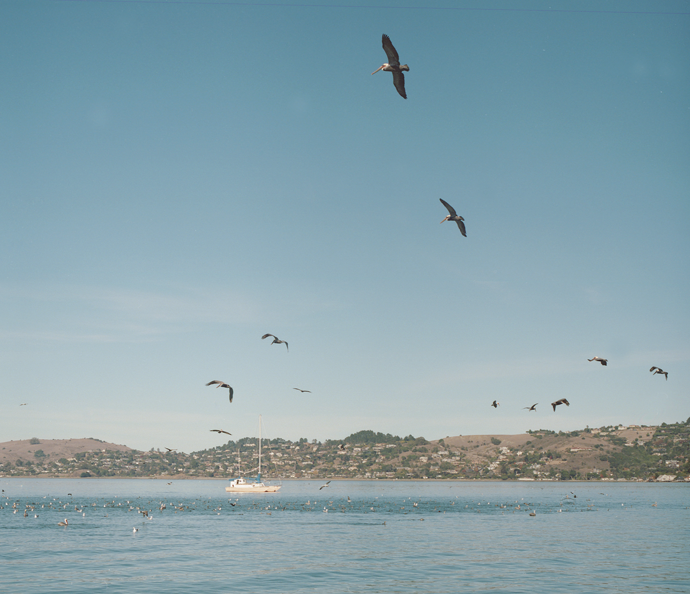
A view of Richardson Bay (detail)
In late 2017, long after I’d lost touch with most of the anchor-outs I’d met years earlier, I visited the anchorage for the last time. Not finding anyone I recognized in Dunphy Park, I walked for a few minutes up the shore to Galilee Harbor to watch the birds forage for food in the beached wreckage of the harbor’s eponymous nineteenth-century schooner.
The Galilee, it is said, still holds the record for the fastest voyage from San Francisco to Tahiti: nineteen days. It arrived in Richardson Bay in 1936, when its owner sailed it up through San Francisco Bay and dropped anchor along the Sausalito shoreline. It never moved again. For many years, a retired sea captain and his wife lived there, followed in the Fifties by another family. After they left, a few years later, the tides gradually wore away the boat’s wooden hull, burying it beneath layers of rocks and sand. Today, what remains of its skeleton is encased in a mound of grass, a portion of its mast jutting out from the earth for crows to perch on.
When Larry and Bo first moved to the anchorage, the Galilee’s portholes would have only just stopped glowing.
I remembered at that moment something Larry said to me the last time I saw him. He was sitting in his chair in the back room of the Evil Eye, his bare feet propped up on the table. “I remember an acid trip I had,” he said, stroking his yellow-white beard. “I was a sperm swimming through my mother’s vagina—well, soon to be my mother—and I wasn’t trying very hard at it. I looked around and the other sperm were just floating around on their backs. And you can beat all the other sperm but you can get there at the wrong time of the month, or end up down someone’s throat or in their hand. To arrive at the right time—it’s just so off the fucking wall. I don’t have a religious thing, but there is something that got me here: the stuff that gets you here, against all odds. You’re just floating along. You get there first, and they close the door.”
I turned toward the shore where Birba’s body had washed up. Dream was walking in from the dock.
I asked how he was doing.
Bo died, he told me.
It had happened a few months earlier. The anchor-outs, Dream said, sent him off as they did anyone who somehow ended up among them. They built him a boat, set it on fire, and pushed it out to sea.






























































































